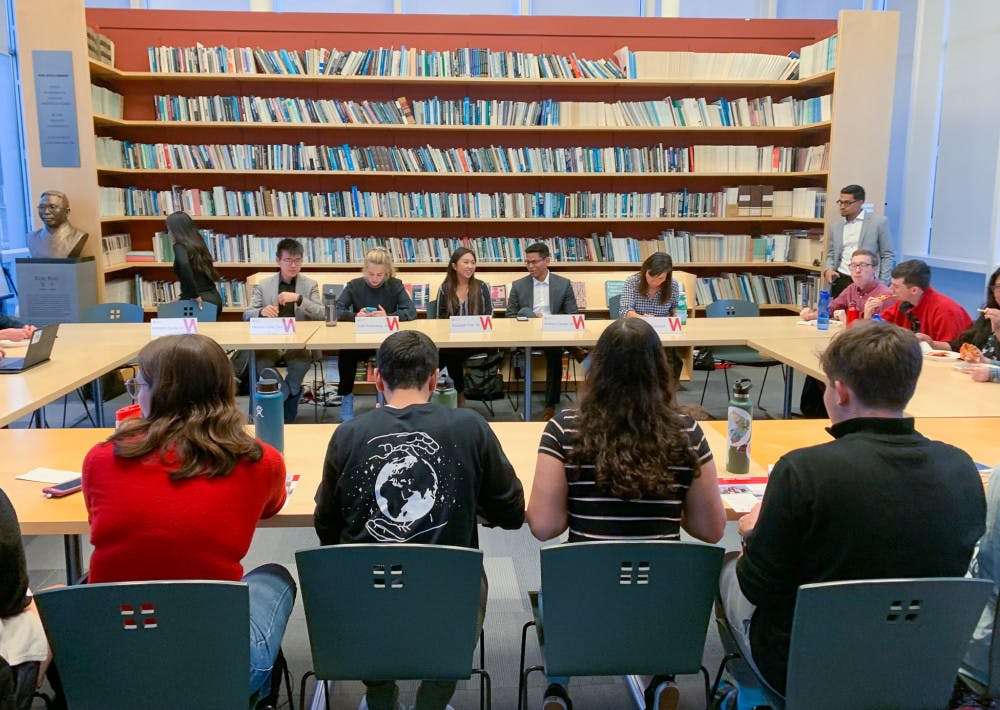As the 2020 presidential race heats up and young people prepare for a high-stakes election, University students are talking about how to best leave their mark.
In a panel Monday evening, five students drew on their own experiences to break down the different ways Brown undergrads can play a role in shaping political dialogue. They highlighted congressional internships, public policy think tanks, non-profits and grassroots organizing as options for students during summers or during the school year — available through the Brown in Washington Program, a co-sponsor of the event.
“2020 is the most important election of our lifetime. And so is every other election,” said Andrew Castillo ’20 to attendees. Castillo worked as a legislative policy intern for Sen. Jack Reed (D-RI) and an organizing fellow for Sen. Kamala Harris’ D-CA campaign for president. He encouraged students to get involved in the upcoming elections and added that campaigns will be looking to hire as many people as possible.
The panelists, who all participated in the Brown in Washington program during the 2018-19 school year, focused on the excitement of their political work despite the long hours and sometimes mundane daily tasks. They spoke about their research and organizing work, and stressed their passion for the policy issues they worked on. Some speakers highlighted reproductive rights and foreign affairs as issues that motivated them.
Panelist Kimberly Davila ’20 interned last fall for Common Cause, a nonpartisan watchdog group based in Washington, D.C. She then spent the summer working in Philadelphia as a field organizer for Organizing Corps 2020, a new initiative by the Democratic National Committee to lay the groundwork for the 2020 election through voter registration, canvassing, community events and volunteer recruitment.
“It’s important for us to get engaged, not only as students, but as young people who are leading future efforts,” she said. “And not just in politics but in a lot of other fields too.”
For Davila, that might mean joining efforts to get out the vote or working on a campaign after she graduates in May.
While no panelist identified openly as conservative, Michael Tian ’20 spoke about his experience working for the right-leaning think tank American Enterprise Institute during his Brown in Washington internship last spring. “I wanted to work for a conservative think tank because I just wanted to challenge my own views and see what it’s like to immerse myself in the other side,” he said.
Tian emphasized the importance of young people mobilizing around issues of student debt, employment in the face of automation and climate change.
Carrie Nordlund, associate director of the Master of Public Affairs program, moderated the event. “Brown students are special in the ways that they see the world and the ways that they can offer unique and distinctive viewpoints,” she told The Herald. “It’s incredibly important that all students, but especially Brown students because of their viewpoints, get involved.”
Monday’s panel took place in the Kim Koo Library and was co-sponsored by the Swearer Center, the Watson Institute of International and Public Affairs, the CareerLAB and Careers in the Common Good. The library was filled with undergraduate students of all class years, as well as students in the Master of Public Affairs program. Many expressed interest in working in politics and policy after the event.
John Graves ’22 attended the panel to hear from students who had worked in government and get advice on landing an internship at a senator’s office or on a presidential campaign. Graves left the event comforted that the panelists felt they had made real policy change and found their work rewarding, even if some of it was menial. “When you look at your work as a whole, it really has a positive benefit,” he said.
Other panelists included Julia Rosenberg ’20, who worked in the office of Sen. Kristen Gillibrand (D-NY) last spring, and Elizabeth Tran ’20, who worked as a communications intern for Harris last fall. Both Rosenberg and Tran hail from the same states as the senators they worked for, and highlighted their passion about the specific issues their respective senators tackled.
One message that came from every corner of the room was that students — and anyone else who can — should continue to get involved in politics, especially as the 2020 elections approach.
“If you have the privilege to be a political participant, you should,” Tian said.
“On a campus like this we do have the ability to influence our peers and make sure that everyone gets involved,” Davila said. “Even if it’s just voting, or even if it’s just canvassing once, anything counts.”





